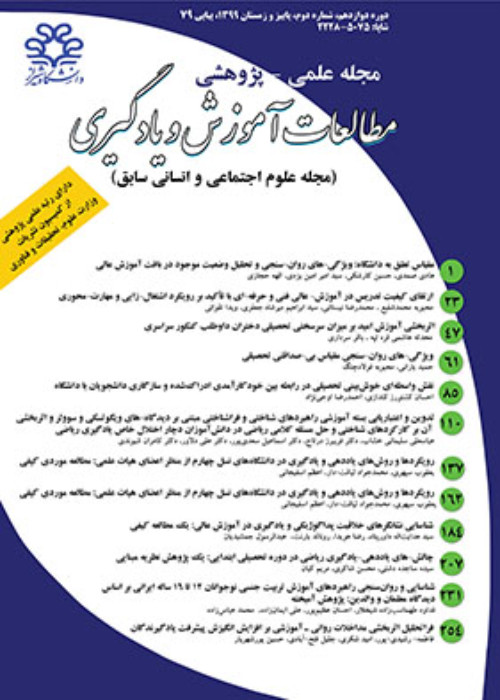The Structural Relationship among Teacher-Student Interaction, Academic Engagement, and Students' Adjustment to School
Author(s):
Article Type:
Research/Original Article (دارای رتبه معتبر)
Abstract:
Introduction
The high school years bring many new challenges and risks to adolescent students' social, emotional, and academic lives (Zee, Koomen, & Vander veen, 2013). Thus, during this critical period, adjustment to school is considered important for most students (Rattelr & Duchesne, 2014). School adjustment is an important indicator of how well adolescents have been able to cope with the challenges and expectations presented by school. In this study according to Sinha & Singh (1993), adjustment is comprised of three components: emotional adjustment, social adjustment, and academic adjustment, all being the skills that students need for success in school and in life. Indeed, schools are interpersonal settings in which relationships are shaped between the teacher and students. Teacher-student relationship provides the context through which students experience the school, and have the potential to positively impact student engagement (Cadima, Doumen, Vershuren, & Buyse, 2015). Researchers have noted that students' perception of teacher-student relationship may be an important factor related to the students' adjustment (Longobardi, Prino, Marengo, & Settani, 2016). Positive teacher-student interaction draws students into the process of engagement and promotes their desire to learn. Accordingly, students who are more engaged in school show better psychological adjustment to school (Wang & Peck, 2013). Consequently, the aim of this study was to investigate the mediating role of academic engagement in the relationship between teacher-student interaction and the students' adjustment.
Research Questions
The present study aimed at investigating the mediatory role of academic engagement in the relationship between teacher-student interaction and school adjustment. Therefore, this study attempted to answer the following questions: -Is it possible to predict students' adjustment based on teacher-student interaction? -Is it possible to predict students' academic engagement according to student-teacher interaction? -Can academic engagement play a role as a mediating variable in the relationship between teacher-student interaction and students' adjustment?
Methods
This research is a correlation study in which the relationships between research variables are studied using equation structural modeling. The statistical population included all first grade of secondary school students in Bushehr city who studied in the academic year of 2017-2018. The participants consisted of 603 high school students (329 girls and 274 boys) who were selected through random multi-stage cluster sampling technique. The research instruments included Questionnaire on Teacher Interaction (Wubbles, Creton, Levy, & Hooymayers, 1993), an Academic Engagement Questionnaire (Reeve & Tseng, 2011), and Sinha-Singh's Inventory for School Students (Sinha & Singh, 1993), which the participants completed in their regular classes. The collected data was analyzed using SPSS and AMOS (version 24) statistical softwares. All research instruments using confirmatory factor analysis and Cronbach's alpha coefficient enjoyed appropriate validity and reliability indices.
Results
The results of structural equation modeling indicated that the model had good fit indices. As predicted, teacher-student interaction could positively and significantly predict academic engagement and adjustment to school. On the other hand, academic engagement could positively and significantly predict the students’ adjustment to school. In the other words, the academic engagement variable could play a mediating role in the relationship between teacher-student interaction and the students' adjustment to school. Moreover, the indirect effect of teacher-student interaction on students’ adjustment to school through the mediation of academic engagement using Bootstrap test was statistically significant.
Discussion and Conclusion
In general, the research findings indicated that teacher-student interaction and academic engagement play a determining role in predicting the students' school adjustment. Consistent with the previous research findings, on one hand teacher-student interaction had strong impact on the students' academic engagement (Reyes, Brackett, Rivers, White, & Salovey, 2012), and on another hand this interaction had direct and indirect effects on the students' adjustment to schools (Longobardi, et al., 2016). The findings are also in line with the previous studies showing a link between higher student engagement and higher school adjustment (Skinner & Pitzer, 2012). This study supports the importance of student-teacher interaction as a protective factor during the students' transition to high school, which is essential to education because of its link to student engagement and schools' social, behavioral, and academic adjustment. Therefore teachers, counselors, and authorities of education are recommended to focus their efforts to promote their relationship with students in order to engage them in school activities and to reach a better school adjustment.Keywords:
Language:
Persian
Published:
Studies in Learning & Instruction, Volume:10 Issue: 2, 2019
Pages:
75 to 99
magiran.com/p1951466
دانلود و مطالعه متن این مقاله با یکی از روشهای زیر امکان پذیر است:
اشتراک شخصی
با عضویت و پرداخت آنلاین حق اشتراک یکساله به مبلغ 1,390,000ريال میتوانید 70 عنوان مطلب دانلود کنید!
اشتراک سازمانی
به کتابخانه دانشگاه یا محل کار خود پیشنهاد کنید تا اشتراک سازمانی این پایگاه را برای دسترسی نامحدود همه کاربران به متن مطالب تهیه نمایند!
توجه!
- حق عضویت دریافتی صرف حمایت از نشریات عضو و نگهداری، تکمیل و توسعه مگیران میشود.
- پرداخت حق اشتراک و دانلود مقالات اجازه بازنشر آن در سایر رسانههای چاپی و دیجیتال را به کاربر نمیدهد.
دسترسی سراسری کاربران دانشگاه پیام نور!
اعضای هیئت علمی و دانشجویان دانشگاه پیام نور در سراسر کشور، در صورت ثبت نام با ایمیل دانشگاهی، تا پایان فروردین ماه 1403 به مقالات سایت دسترسی خواهند داشت!
In order to view content subscription is required
Personal subscription
Subscribe magiran.com for 70 € euros via PayPal and download 70 articles during a year.
Organization subscription
Please contact us to subscribe your university or library for unlimited access!


